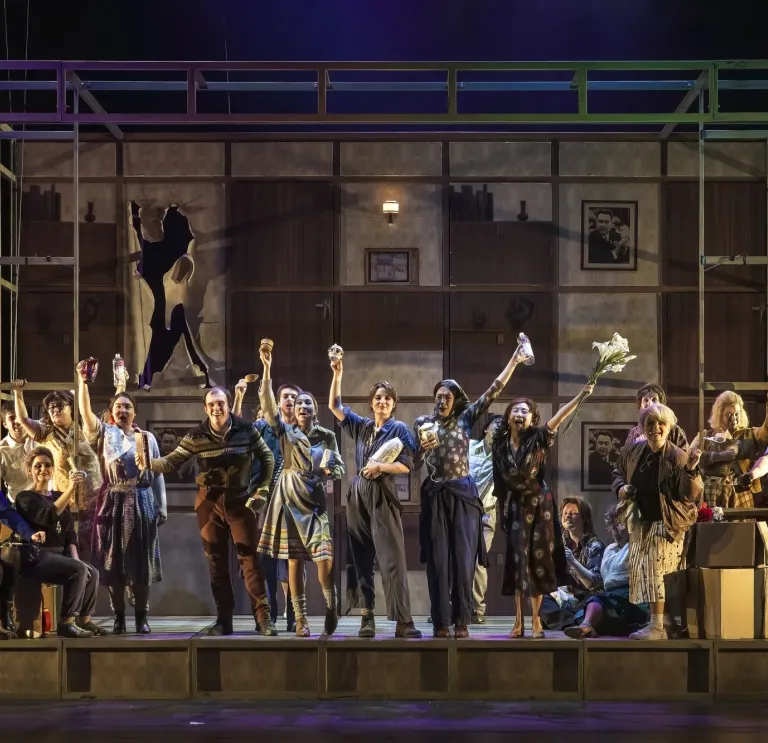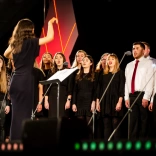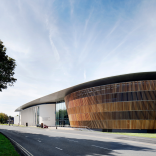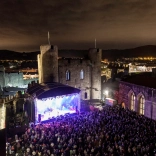Legendary Italian tenor Andrea Bocelli once said there are two things necessary to sing opera, the voice and the passion. As a country famed for both, it’s easy to see how the dramatic art form found a sturdy foothold in Wales – albeit with a bit of a Welsh twist.
Established in 1943 by the son of a Welsh miner, Welsh National Opera has earned global recognition for its renditions of classic productions like La traviata and Madame Butterfly, which tour Wales and far beyond. But the company has also built a reputation around its work to make opera accessible for all, hosting free events and commissioning new productions that touch on pertinent modern subjects, such as the suffragette movement and human rights issues.
Here’s an introduction to opera done the Welsh way.
The Land of Song
We’re a nation of singers in Wales. We sing in school, in church, in pubs and – with added passion – at sporting grounds. As a result, the activity has become ingrained into our national identity, with the country garnering the nickname, "The Land of Song".
Historically, we’ve relied on songs to preserve and promote our culture and language, most notably at annual eisteddfodau festivals (including the National Eisteddfod), which date back to the 12th century. But singing has also served as a means of free entertainment, particularly in the country’s once-prominent coal mining communities, where men gathered to sing choral music after a long day underground – and male voice choirs remain popular throughout the country to this day.
With such a strong heritage of singing, the country was fertile ground for the artform of opera to take root.


The history of Welsh National Opera
The late 19th century saw a number of attempts to establish an opera company in Wales, but nobody struck the right note until singing teacher Idloes Owen and a group of friends had a crack at it in the early 1940s.
Idloes, born in the village of Merthyr Vale, was the son of a coal miner and briefly worked in the mines himself as a young boy. His real passion, however, was music, singing in the church choir and teaching himself the piano and violin after work. When his father died, Idloes believed his dreams of pursuing a career in music were all but over, until the local community stepped in, organising a collection fund to send him to university in Cardiff.
Led by Idloes, with a chorus that included a butcher, pub landlord and railway workers, the first rehearsal of what would become Welsh National Opera took place in January 1944. The company’s first performance was held at the Prince of Wales Theatre in Cardiff two years later, a very successful but slightly ramshackle double bill of Mascagni’s Cavalleria Rusticana and Leoncavallo’s Pagliacci, which saw the actors wearing their own costumes and the construction of the set continue right up until the opening night.
From these humble beginnings, the company would grow from strength to strength, becoming an all-year-round operation that quickly asserted itself as one of the finest opera companies in the UK, as well as the first from outside of London to tour the English provinces. The company became fully professional in 1976 and moved into its permanent home at Wales Millennium Centre in 2004.

Welsh National Opera today
Today Welsh National Opera performs a string of operas every year to sell-out crowds at its home in Wales Millennium Centre. The company also tours venues around Wales and England, as well as performing further afield, including the USA, Japan and Oman.
The company regularly takes on the classics, producing well-received versions of La bohème, The Barber of Seville and Carmen in recent years, but it has also made a habit out of performing lesser-seen works, from staging the first UK production of Berg’s opera Lulu in 1971 to bringing a new version of Prokofiev’s epic War and Peace to Wales in 2018. The company also commissions new productions for the stage, such as Rhondda Rips It Up!, a work focused around the life of Welsh suffragette Margaret Haig Thomas.


Over the years, the organisation has worked with a number of Welsh operatic greats, including Sir Geraint Llewellyn Evans and Bryn Terfel, who sang at the Coronation of King Charles III.
Aside from staging great productions, the Welsh National Opera has a complementary ambition to make opera accessible to all, using initiatives such as WNO Youth Opera, an award-winning training programme for young singers aged 8-25 which gives them skills and performance opportunities for a career in music and opera. It also endeavours to keep the art form relevant, dedicating its 2019 season to the topic of human rights, as part of an ongoing partnership with the Welsh Refugee Council.
How to see a performance by Welsh National Opera
Welsh National Opera stages productions throughout the year, most prominently at Wales Millennium Centre in Cardiff, but also in venues around Wales and further afield.
Visit Welsh National Opera official website for details of upcoming performances and information on how to buy tickets.
More information:





